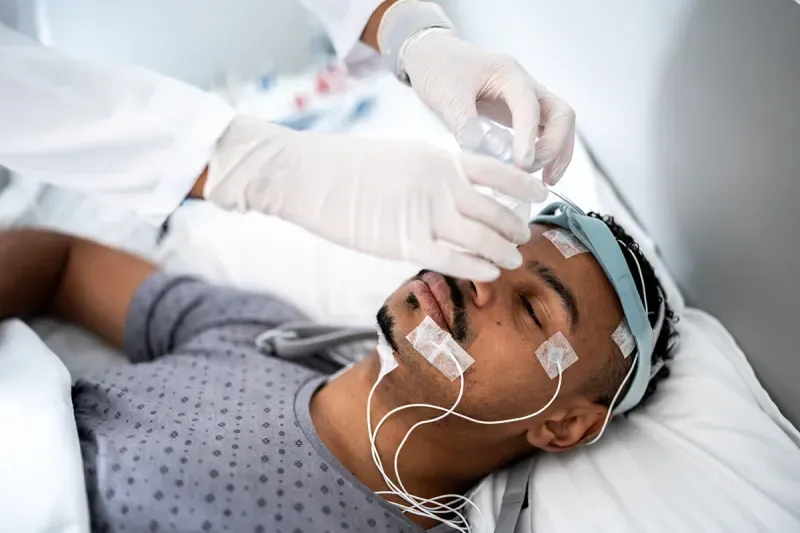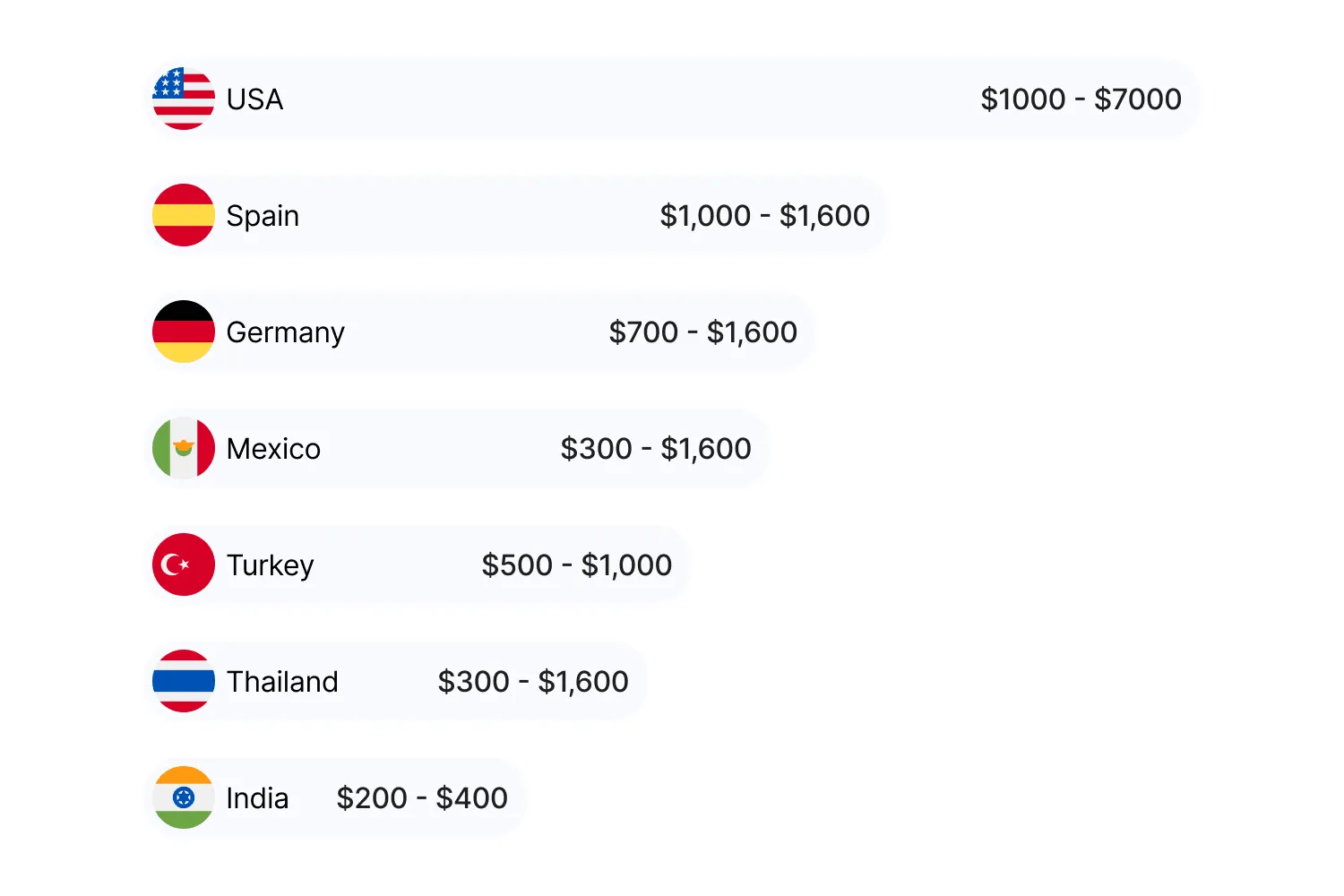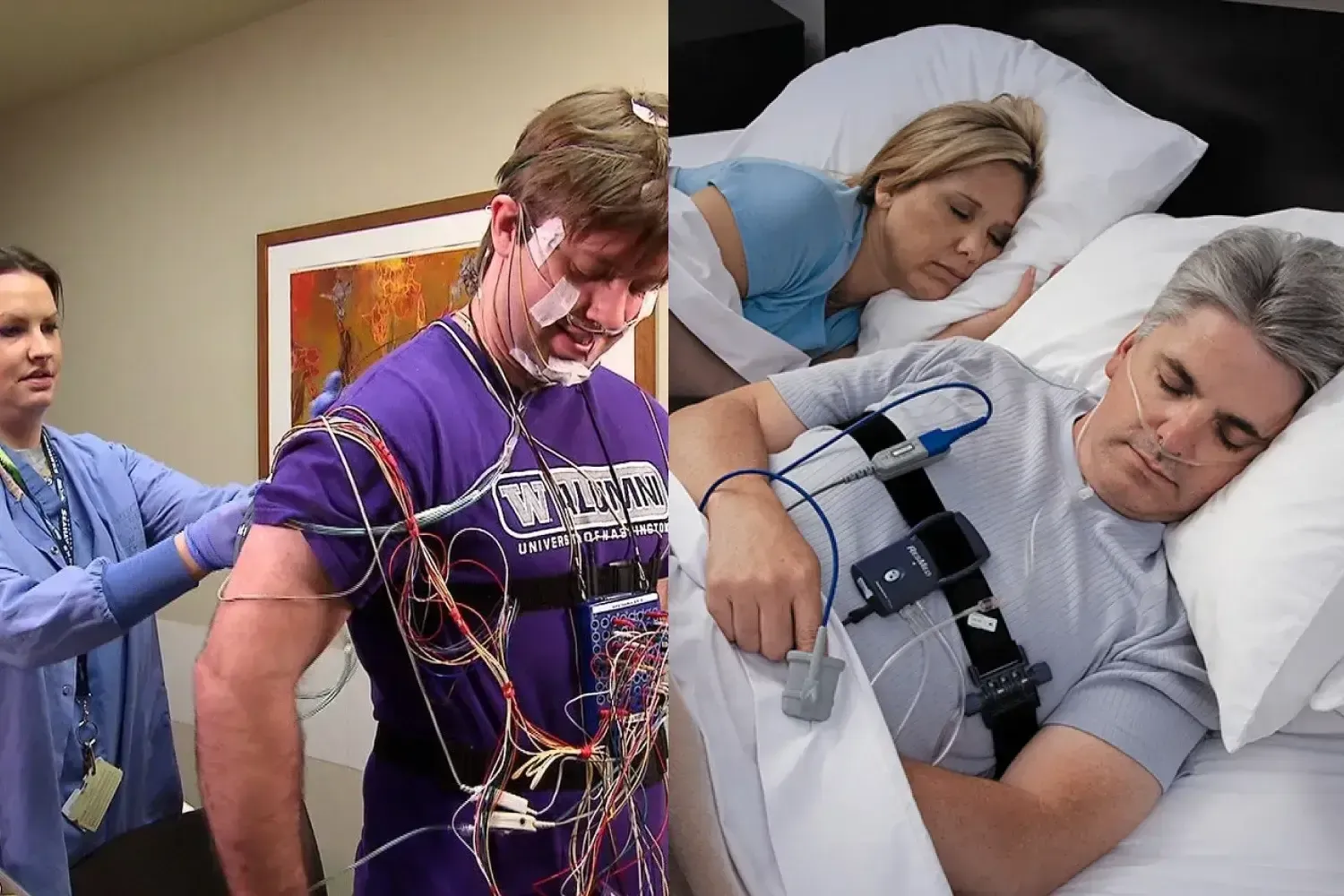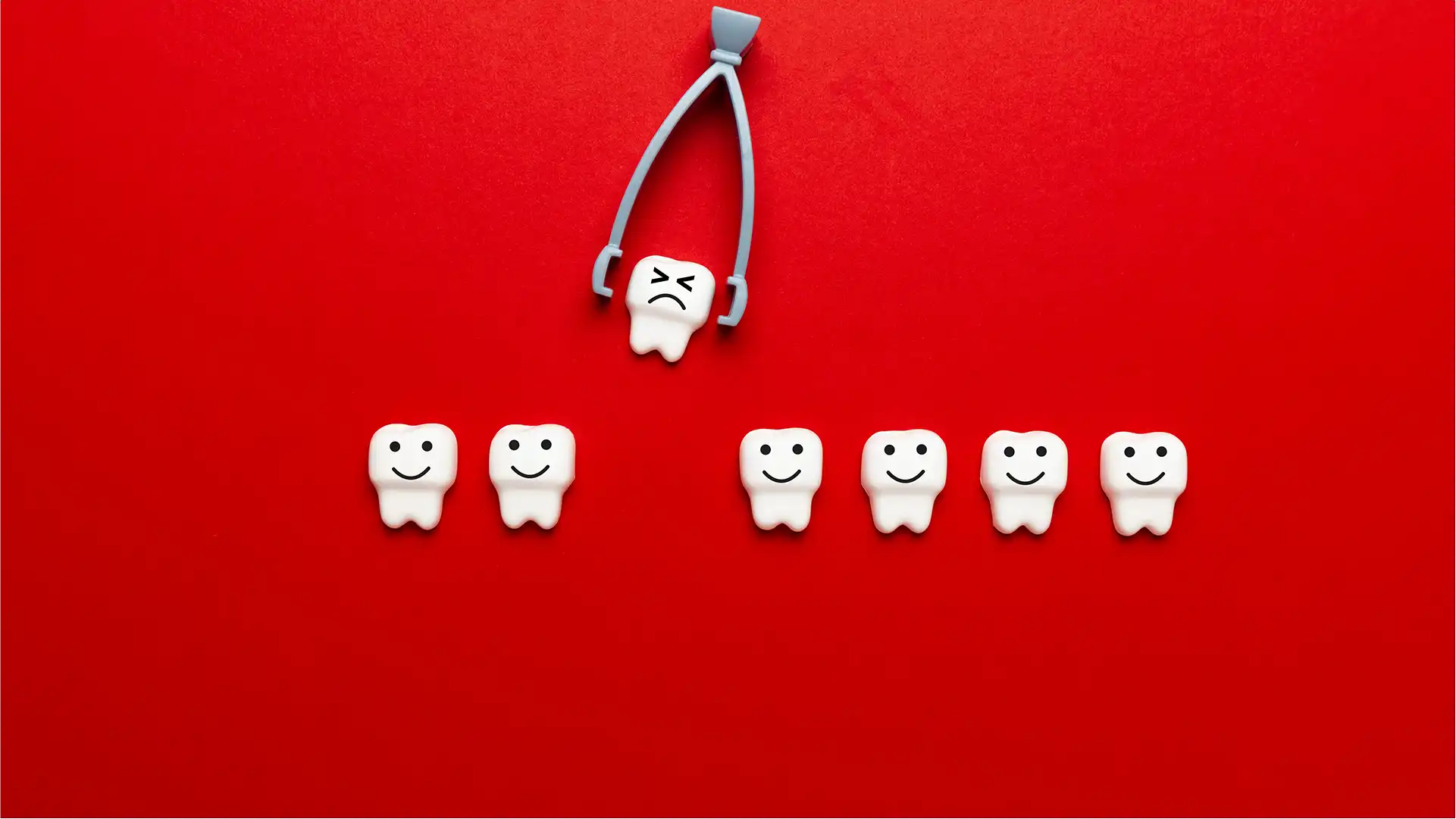Sleep Study Cost: What to Expect, Where to Go, and How to Save

Tired of feeling tired all the time? You’re not the only one. Around 62% of adults around the world deal with sleep issues. And it’s more than just annoying. Lack of good sleep can leave you feeling low, constantly tired, and more vulnerable to serious health issues like heart disease and depression.
A sleep study can help you get to the root of the problem. It’s a simple test that helps identify what’s disrupting your sleep, so you can take steps toward better rest and overall wellness.
In this blog, we’ll explain how sleep studies work, who should consider one, and how much a sleep study costs. Let’s dive in!
What is a sleep study (polysomnography)?
Polysomnography, commonly known as “sleep study”, is a medical test that detects changes taking place in your body while you sleep, such as brain waves, breathing rate, muscle activity, and more.
It is important to diagnose the sleep disorder to treat it effectively. By getting a sleep study, you can start working on the exact underlying cause of your sleep problems.
How does a sleep study work?
When you are sleeping, major systems of your body undergo some changes. You experience two sleep phases - NREM and REM.
During the REM stage, your eyes move rapidly, breathing speeds up, and blood pressure increases. Likewise, in the NREM phase of the sleep cycle, your heart, brain, and muscle tone undergo different changes.
In a sleep study, electrodes (sensors) are placed on your head, face, legs, and chest to record these changes:
-
EEG (Electroencephalography) - measures your brain's electrical activity.
-
ECG (Electrocardiogram) - monitors your heart rate.
-
EMG (Electromyogram) - detects muscle activity (e.g., leg movements).
-
EOG (Electro-oculogram) - monitors eye movement.
-
Pulse oximetry - records blood oxygen levels.
-
Breathing rate and pattern
All these evaluations, taken during a sleep study, help your doctor to correctly diagnose your condition, which is causing sleep deprivation and sleep-associated disorders.

Do I need a sleep study?
Your doctor might suggest that you get a sleep study if you:
-
Snore excessively
-
Wake up many times as a result of your obstruction in your breathing
-
Experience uncontrollable daytime sleepiness
-
Have the urge to move your legs, resulting in difficulty falling asleep
-
Stay awake for hours even though you want to sleep
-
Talk or walk around in your sleep
If you experience any of the above-mentioned symptoms, you could have a sleep disorder.
Having disrupted and low-quality sleep in the long run results in serious health problems such as heart attack and stroke. Therefore, a sleep study is the first step in protecting your body from health complications in the future.
What can a sleep study diagnose?
Sleep study is used for the diagnosis of the following disorders:
-
Narcolepsy (sudden sleep attacks)
-
Sleep Apnea (interruption in breathing while sleeping)
-
Parasomnias such as sleepwalking, sleep terrors, and sleep paralysis.
-
Idiopathic Hypersomnia (excessive sleepiness)
How much does a sleep study cost?
In the United States, a sleep study typically costs you around $1,000 to $7,000. Other countries, like those in Asia and Europe, offer far better prices with the same quality of medical procedures as the U.S.
Here are some places where you can get polysomnography at an affordable price:
1. Mexico
Mexico is an ideal place for medical facilities for people from America. Travelling time from the U.S. to Mexico is considerably less, and treatment prices are in an affordable range from $700 to $1900.
2. Thailand
Hospitals in Thailand are recognized by JCI (Joint Commission International) and ISO (International Organization for Standardization) for the high-quality facilities they offer. You can save thousands of dollars by choosing Thailand for the sleep study. The cost ranges from $300 to $1,600.
3. India
India is rapidly becoming a spot of medical tourism. Here, you can get the sleep study done at a super-affordable price of $200 to $400.
4. Germany
All modern treatments and medical procedures are available for you in Germany at lower prices in comparison to the U.S. Here, a sleep study will typically cost you around $700 to $1,600.
5. Turkey
Turkey is a famous medical tourism site for a reason. Hospitals in Turkey provide world-class services with no waiting lists at budget-friendly costs. The average cost of polysomnography here is from $500 to $1,000.
6. Spain
Internationally accredited hospitals offer the best medical facilities, that too at an affordable price. For a sleep study, you will have to pay around $1,000 to $1,400.
Sleep study cost: U.S. vs. medical tourism destinations
| Country | Average Cost (USD) |
|---|---|
| United States | $1000 to $7000 |
| India | $200 to $400 |
| Turkey | $500 to $1,000 |
| Thailand | $300 to $1,600 |
| Spain | $1,000 to $1,400 |
| Germany | $700 to $1,600 |
| Mexico | $300 to $1,600 |
Note: The prices may vary depending on the clinic and type of sleep study. Contact us for an exact cost estimate!

Does insurance cover a sleep study?
Most insurance plans, including Blue Cross Blue Shield, cover sleep studies if your doctor orders them for medical reasons like suspected sleep apnea.
Government insurances, Medicaid (for low-income individuals) and Medicare (for people above age 65 or with disabilities), cover about 80% of sleep study costs for you.
Private insurance companies also provide coverage for most of the cost of polysomnography. However, this heavily depends on the type of insurance plan you have.
At-home sleep test vs In-lab sleep study
There are two main ways doctors test for sleep disorders: one happens at a lab, the other at home. Let’s take a closer look at each:
In-lab sleep study (Polysomnography)
An in-lab sleep study, or polysomnography, is a thorough overnight test done at a sleep center or hospital. It’s considered the gold standard for diagnosing a wide range of sleep disorders.
When you arrive in the evening, a sleep technician attaches 20 to 25 small sensors to your scalp, face, chest, legs, and fingers. These track brain waves, breathing, heart rate, oxygen levels, muscle activity, snoring, and body position.
You’ll sleep in a quiet, private room while a technician monitors you remotely through video and audio. If needed, they may introduce a CPAP machine partway through to test its effectiveness.
The study usually lasts 6 to 8 hours. In the morning, you remove the sensors and provide feedback on your sleep experience.
At-home sleep study
An at-home sleep test is a simpler, more comfortable option done in your own bed. It’s mostly used to diagnose obstructive sleep apnea in otherwise healthy adults.
You’ll get a portable kit with 3 to 7 sensors—typically a nasal cannula for airflow, a pulse oximeter for oxygen levels, and belts to measure chest and abdominal movement. Some kits may also track body position and heart rate.
Unlike the in-lab version, there’s no technician with you. You’ll follow easy instructions, wear the gear overnight, and return the equipment the next day. Specialists then review the data and provide results.
This type of test is less expensive and more convenient, but it doesn’t capture as much information. It’s not suitable for diagnosing more complex disorders like narcolepsy or restless leg syndrome.

Here’s a quick side-by-side comparison:
| Feature | In-Lab Sleep Study | At-Home Sleep Study |
|---|---|---|
| Location | Sleep center or hospital | Your own home |
| Number of Sensors | 20-25+ | 3-7 |
| What it measures | Sleep stages and cycles (light, deep, REM sleep) Breathing interruptions (apneas, hypopneas) Oxygen saturation drops Heart rhythm irregularities Limb movements and snoring Body position changes | Breathing patterns and airflow Blood oxygen levels Heart rate Respiratory effort Body position (sometimes) |
| Monitoring | Technician present overnight | No technician, self-administered |
| Cost | $1,000 – $10,000+ | $150 – $500 |
| Best For | Complex or multiple sleep disorders | Suspected obstructive sleep apnea |
| Convenience | Less convenient, unfamiliar environment | Very convenient, sleep at home |
Wondering where to start your sleep health journey? QCG can guide you step-by-step—from booking to recovery. Get in touch now!
What to do before getting a sleep study?
Here is a list of things you should consider before going for a sleep test:
1- Limit alcohol and caffeine
Avoid drinking alcohol and caffeinated drinks (e.g., coffee, tea) as they can interfere with your sleep.
2- Keep your nails clean
Fake nails or nail polish interfere with the measurement of blood oxygen. So, avoid wearing them on the day of the sleep study.
3- Skip daytime naps
Don’t take naps during the day, otherwise, you may find it difficult to fall asleep during the procedure.
4- Avoid hair and skin products
Don’t put oils and lotions in your hair or on your face. The sensors need a clean and dry skin surface for attachment. So, take a shower before leaving for the sleep center.
5- Pack essentials
Pack your bag for your stay in the sleep center. It will contain your toothbrush, pajamas, and clothes.
6- Take your pillow with you
Bring your pillow and blanket with you. This will help you fall asleep naturally during the sleep study.
7- Consult your doctor
Inquire with the doctor about the medications you're on. Ask him whether you should continue taking them or stop temporarily.
Is a sleep study dangerous?
The idea of wires and electrodes attached to your body for a whole night might make you anxious. But there are no health risks in a sleep study.
Sleep study is a painless, safe, and non-invasive procedure. The only side effect is the mild skin irritation that may result from the glue or tape that is used for sticking the sensors to your skin.
Is a sleep study worth it?
Absolutely, it’s worth it.
Sleep problems aren’t just about feeling tired or cranky. If left untreated, they can lead to serious health issues like heart disease, stroke, diabetes, and even depression.
For example, sleep apnea has been shown to increase the risk of coronary heart disease by as much as 30% and heart failure by 140%, according to research.
Getting a proper diagnosis means you can start the right treatment, which often means more energy, better mood, and overall improved health. Plus, spotting these problems early can actually save you money later by helping you avoid costly health issues.
And if sleep study costs or long wait times are a concern, some people look into getting it done overseas. It’s often more budget-friendly and quicker—just make sure you’re going to a trusted clinic.
Ready to take control of your sleep and health? QCG can help you find the best sleep study options abroad. Get started on your journey to better sleep!

